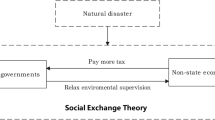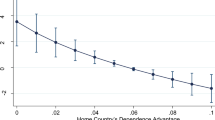Abstract
In this paper, we investigate how a country's choice of environmental policy instrument affects the international competitiveness of its firms. We show that in a Cournot-Nash equilibrium, the total market share of firms regulated through tradeable emission permits increases relative to that of the firms operating under command and control due to better allocation of total abatement among the firms in the country. Our work suggests that free trade situations should not only result in similar environmental standards but also in similar regulatory regimes. It may come as no surprise that the environmental authorities in Canada are seriously considering following the United States in instituting a tradeable emission permits mechanism.
Similar content being viewed by others
References
Baumol, W.J., and W.E. Oates. 1988.The Theory of Environmental Policy. Cambridge U.K.: Cambridge University Press.
Copeland, B.R. 1990. “Taxes Versus Standards to Control Pollution in Imperfectly Competitive Markets.”Mimeo: University of British Columbia.
Copeland, B.R. 1994. “International Trade and the Environment: Policy Reform in a Polluted Small Open Economy.”Journal of Environmental Economics and Management 26: 44–65.
Copeland, B.R., and S. Taylor. 1992. “North-South Trade and the Environment.”Mimeo: University of British Columbia.
Cropper, M. L., and W. Oates. 1992. “Environmental Economics: A Survey.”Journal of Economic Literature XXX: 675–740.
Hahn, R.W. 1984. “Market Power and Transferable Property Rights.”Quarterly Journal of Economics 99: 753–765.
Hoel, M. 1991. “Efficient International Agreements for Reducing Emissions of CO2.”Energy Journal 12: 93–107.
Hoel, M. 1992. “Carbon Taxes: An International Tax or Harmonized Domestic Taxes?”European Economic Review 36: 400–407.
Kennedy, P. 1994. “Equilibrium Pollution Taxes in Open Economies With Imperfect Competition.”Journal of Environmental Economics and Management 27: 49–63.
Krutilla, K. 1991. “Environmental Regulation in an Open Economy.”Journal of Environmental Economics and Management 21: 127–142.
Leonard, H. J. 1988.Pollution and the Struggle for the World Product. Cambridge, U.K.: Cambridge University Press.
Lucas, R.E.B., D. Wheeler, and H. Hettige. 1992. “Economic Development, Environmental Regulation, and the International Migration of Toxic Industrial Pollution 1960–88.”World Development Report. WPS 1062: The World Bank.
Malueg, D.A. 1990. “Welfare Consequences of Emission Credit Trading Programs.”Journal of Environmental Economics and Management 19: 66–77.
Markusen, J.R. 1975a. “International Externalities and Optimal Tax Structures.”Journal of International Economics 5: 15–29.
Markusen, J.R. 1975b. “Cooperative Control of International Pollution and Common Property Resources.”Quarterly Journal of Economics 89: 618–632.
Markusen, J.R., E.R. Morey, and N.D. Olewiler. 1993. “Environmental Policy When Market Structure and Plant Locations are Endogenous.”Journal of Environmental Economics and Management 24: 69–87.
McGuire, M. 1991. “Regulation, Factor Rewards and International Trade.”Journal of Public Economics 12: 93–107.
Merrifield, J.D. 1988. “The Impact of Selected Abatement Strategies on Transnational Pollution, the Terms of Trade, and Factor Rewards: A General Equilibrium Approach.”Journal of Environmental Economics and Management 15: 259–284.
Pethig, R. 1976. “Pollution, Welfare, and Environmental Policy in the Theory of Comparative Advantage.”Journal of Environmental Economics and Management 1: 160–169.
Sartzetakis, E. S. 1993.Emission Permit Trading and Market Structure. Ph.D. Dissertation: Department of Economics, Carleton University, Ottawa.
Tobey, J. A. 1989.The Impact of Domestic Environmental Policies on International Trade. Ph.D. Dissertation: Department of Economics, University of Maryland.
Tobey, J. A. 1990. “The Effects of Domestic Environmental Policies on Patterns of World Trade: An Empirical Test.”Kyklos 43: 191–209.
van der Ploeg, F., and A. de Zeeuw. 1992. “International Aspects of Pollution Control.”Environmental and Resource Economics 2: 117–139.
Xepapadeas, A. 1994. “Optimal Management of the International Commons: Resource Use and Pollution Control.”Fondazione Eni Enrico Matter, working paper No 4.94.
Author information
Authors and Affiliations
Additional information
Most of the work was completed during the time that E.S. Sartzetakis was a post-doctoral fellow at the Department of Economics, Université Laval. He gratefully acknowledges the hospitality of the department during this period. Earlier, versions of the paper were presented at the fifth conference of the European Association of Environmental and Resource Economists and at the 1993 Rancontre Franco-Québécoise du GREEN. We would like to thank Joseph Doucet, Thomas Ross, and Aart de Zeeuw for extremely helpful suggestions. We would also like to thank two anonymous referees of this journal for their comments. Financial support from the LRSA of the Faculté des sciences de l'administration, Université Laval, the Groupe de rechearche en économie de l'énergie et des ressources naturelles (GREEN), Université Laval, and the Centre for International Business Studies (CIBS), University of British Columbia, is gratefully acknowledged. The responsibility for errors and omissions remains ours.
Rights and permissions
About this article
Cite this article
Sartzetakis, E.S., Constantatos, C. Environmental regulation and international trade. J Regul Econ 8, 61–72 (1995). https://doi.org/10.1007/BF01066600
Issue Date:
DOI: https://doi.org/10.1007/BF01066600




